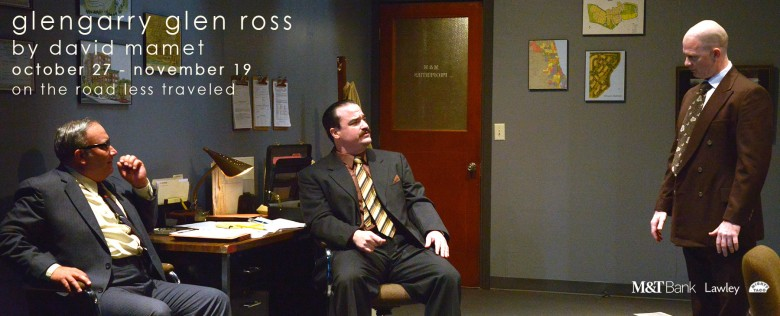David Mamet fans will love Road Less Theater’s production of Glengarry Glen Ross. This 1984 Pulitzer Prize-winning ensemble piece had its world premiere in London in 1983 and has played on stages large and small ever since.
It captures the world of the the down-and-dirty, grubby little men who inhabit the underbelly of American capitalism. These are not the Captains of Industry who make the front pages and acquire their gazillions on the labor of the masses or by manipulating markets. No Carnegies, Rockefellers, Kochs, or Gates’ in this crowd. These are the men with greasy, slicked-back hair wearing ill-fitting suits, who dream of being real estate moguls like Donald Trump, and have his same moral and ethical sensibility. They are the ten percenters, the bottom feeders who go door to door to sell overpriced “units” in Florida or Oklahoma to naïve citizens searching for the American Dream, all the while searching for it themselves. They talk and talk and talk and almost never listen. They use words like “chink” and “wog” without batting an eye. Their jargon is interspersed with all the usual sexual insults, or in some instances their sexual insults are interspersed with jargon. They are all about getting “leads” and “closing,” about beating each other on the “board” that lists each man’s sales for the month, the highest grosser winning a Cadillac, while the unseen bosses, Mitch and Murray, rake in the ninety percent. They are the people you would not want to sit next to at a dinner party. They ooze fear and desperation and have no consciousness about how pitiful they are.
They are not likeable people. And yet the actors in this production are so good that you almost kind of sort of want to feel sorry for them, with the exception of the mysterious “man from downtown,” whose arrogance stands out even in this profane, arrogant milieu.
In the opening scene in the Chinese restaurant, David C. Mitchell as Shelly Levene, the oldest salesman and well past his prime, pleads and wheedles, begs and threatens, and ultimately tries to bribe John Williamson, the younger company man played by Steve Brachmann, into giving him good “leads.” Williamson barely gets a word in for long minutes at a time, and seems a rather mild fellow until… Their interchange sets the tone for the play, each character with his own speech pattern and survival mechanism.
In the next scene at the restaurant, Patrick Moltane as Dave Moss aggressively talks at another salesman, Greg Aaronow played by David Marciniak as an outwardly fearful, milder man. Mr. Moltane smokes and talks and smokes and talks, every word and movement almost an attack, manipulating the older terrified man into a scheme in which he has no desire to participate.
And then there is Richard Roma, played with sleazy, creepy grace if there can be such a thing, by Matt Witten. He is the penultimate user, taker, deal-maker. In the third scene at the restaurant, he picks up the unsuspecting James Lingk, played with understandable confusion by Dave Hayes. Roma talks and talks and talks, while Lingk merely nods, as if in thrall to Roma’s non-stop verbiage. And what does Roma talk about? No matter, as long as he can string Lingk along until he can get him sign a contract and “close.”
In Act Two, all hell breaks loose and we see just how terrified and desperate these men are. They are frantic and distraught, at their wits end, and without an ounce of the milk of human kindness. They fight each other, battle to be better than the other guy, rip off their customers, and never have a moment of self-reflection. They feel bad only for themselves when their schemes fail.
This is Mamet’s take on capitalism during the 1980s era of “Reaganomics,” when all of the little people were supposed to be grateful for the “trickle-down effect” from on high, while the rich became richer than ever. That we are again openly revisiting that era makes this play as timely today as it was almost thirty-five years ago. It makes the audience squirm, which was surely Mamet’s intent. Not for the faint of heart. No saving grace here.
In her set design, Dyan Burlingame cleverly uses a wall in the non-luxurious office to open up into the Chinese restaurant for the first act. Very nice.
Scott Behrend directs. Each actor totally inhabits his character, and Mr. Behrend keeps up the pace of Mamet’s highly stylized dialogue of stops and starts, incomplete sentences, stream of consciousness and manipulative monologues. No resting on laurels here. The frenetic energy of the production mimics the energy of those “loser” salesmen.
While not easy to watch, Glengarry Glen Ross is a great ensemble play that speaks to a dark part of the American psyche, and although we most likely would not like to have it over for dinner on a regular basis, it is most assuredly a part of our culture, and and we deny it at our peril.

